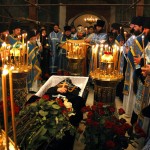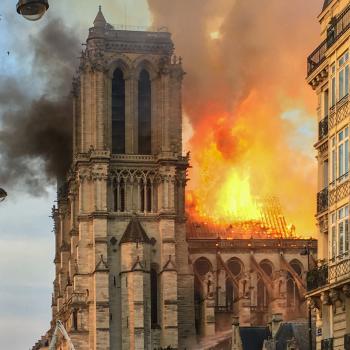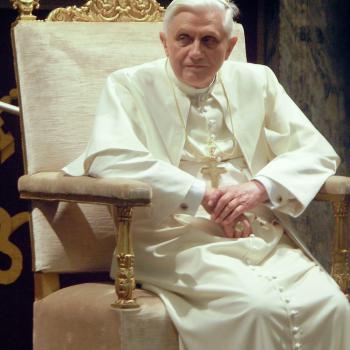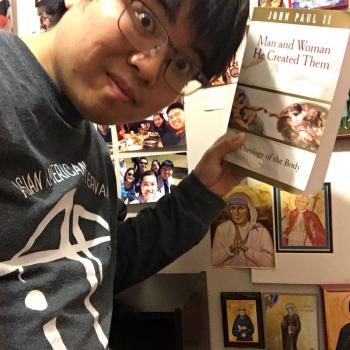![Vancouver at Night - by popejon2 from Paddington, Australia (Vancouver_at_Night_(6692752995) [CC BY 2.0 (https://creativecommons.org/licenses/by/2.0/deed.en)] via Flickr](https://wp-media.patheos.com/blogs/sites/721/2015/11/Vancouver_at_Night_6692752995-1024x680.jpg)
Much has been said about how the show goes in and out of English, Cantonese, and Mandarin. The liberal Canadian media machine has in fact gone into overdrive, churning out articles celebrating the ‘multiculturalism’ of the show, commenting on how the show breaks down (Anglophonic, and presumably Francophone? – this is Canada, after all) barriers through a cast that is purportedly ‘all-Asian,’ and is presumably targeted toward a ‘Chinese audience.‘ I’ve spent the better part of yesterday’s Twitter feed lampooning these journalistic reductions, although I have to praise (as the cast and producers do) the phenomenal review John Doyle gave in the Globe and Mail on the gorgeous messiness of the show, as well as the painfully obvious pointer made in TV, eh? that the show will appeal to wide audiences, underscored by Loretta Yu’s interview in VanCity Buzz where she makes the point that ‘these stories …are universal across the board whether you are Chinese-Canadian or whether you’re Ukrainian-Canadian or if your family has been here for generations and generations’ (oh, be still my burning heart, especially because of this Ukrainian-Chinese Catholic mashup in Richmond, BC).
The truth of these remarks has been borne out – I do think the show is gorgeous, it obviously appeals to me, and I have been obsessing over it all day. Let’s just take that as read.
What I really want to begin mulling about – and I’m sure this is going to be an ongoing process until the eight episodes run their course (but take heart! a second season is rumored to be in planning stage!) – is that perhaps what is making this show so compelling in these first two episodes is that it is NOT about identity. It doesn’t come across as a cheap ploy to get a Chinese audience, to use Asian bodies to sell a product. It has instead the feel of a very human story, a narrative of persons who find themselves embroiled in the crazy soup of contemporary Vancouver and its maddening property market politics and attendant confusion about race, ethnicity, migration, and even religion.
The joke I’ve been making all day today is that Blood and Water is especially realistic about its portrayal of white people. What I feel is missed by some of the ‘multicultural’ celebrations of the show is Jo Bradley’s relationship with Detective Gorski, an older, apparently white guy who presumes that Jo is incompetent at everything she’s doing – from interrogating a drug dealer to getting information from the Xie family to being the ‘mouthpiece’ of the investigation. I was literally shaking in my seat watching Gorski’s microaggressions played out on screen, reminded at some level of some of the microaggressions and presumptions of incompetence I’ve only ever experienced here in Vancouver. For my American friends who made up those presumably ‘politically correct’ terms, you ain’t been messed with thoroughly until you’ve lived in a place where the celebration of multiculturalism tends to paste over any talk of race, and then when race is talked about, it’s being spun by property developers to price you out of the market. To see that on the screen was so good as a form of poetic justice, so good I felt it hurt.
But it’s poetic justice too. I found myself wondering what Gorski’s baggage was. If we get a sense of Bradley’s problems – her uterine cancer, her own family issues, her difficulties at work – and if we are poised to see and hear more than we ever want to know about the Xie family, I want to know why, of all possible Vancouver last names, this detective has a Polish last name: Gorski. Who is he? What’s his deal? Are we going to get a sense of his family history? Is he actually Polish? And if he’s Polish, is he Catholic? And if he’s Polish Catholic but not practicing, would that position his spiritual-but-not-religiousness a marker of his whiteness? And if he is practicing, goodness, could this be leveraged as commentary on race and the Vancouver Archdiocese? – which, if you want a complicated religious institution, that’s complicated! As Polish Catholic blogger and troll extraordinaire Artur Rosman constantly reminds me, Polish people don’t necessarily consider themselves white – their queen is the Black Madonna of Częstochowa, for heaven’s sake. I’m sure this last revelation might come as quite a shock for an Asian audience, but it’s perhaps more true than we all might think: critical theorist Slavoj Žižek points out in his short book The Fragile Absolute where he talks about how liberal multiculturalists have always felt it was ok to be racist toward Eastern Europeans, whose complaints are seldom heard because their skin colour is unfortunately the same as Western Europeans. But all that’s to say, a guy with a last name Gorski had to become white if he’s going to act all microaggressive like that. What’s his deal, Blood and Water? Is this maybe season 2 or 3 or 10 material?
If it might turn out that not all ‘white people’ were white to begin with, it’s definitely one of the show’s premises that not all ‘Chinese people’ are ‘Chinese.’ There’s Jo Bradley: Steph Song says she’s been learning Mandarin and some Cantonese, but I haven’t heard a word out of her mouth as of episode 2. Then there’s the Xie family, whose last name 謝 is very familiar territory for me – it’s just that I use the Cantonese spelling ‘Tse.’ The Xie family speaks Mandarin to each other, but Charlie’s wife Teresa speaks Cantonese. She’s also made to feel that she belongs to a different class – someone framed as a gold-digger and a heroin addict – which finally makes me feel proud to be the vulgar Cantonese person that I’ve always been, sans narcotics use. In times to come, this show is going to be excellent to throw at academics and journalists asking me for my expert opinion on ‘what the Chinese community in Vancouver’ thinks of a certain issue. The real question is, what is the Chinese community in Vancouver, and how many of them are there?
That I’ve engaged in so much verbal diarrhea above bespeaks the power of the show to suck me into these characters’ worlds. I’m hooked, and it doesn’t feel like it’s to some ideology of multiculturalism, whiteness, Chineseness, whatever. These characters are persons, they have stories, and I want to know them.
Case in point: I even want to get to know Gorski the Microaggressive Detective. Strange things you’re doing to me, Blood and Water, very strange.












